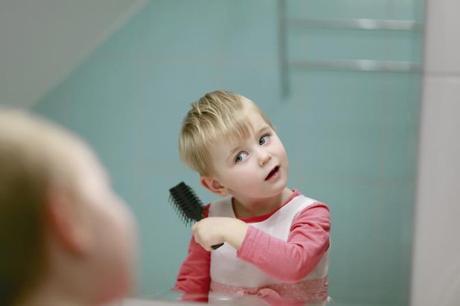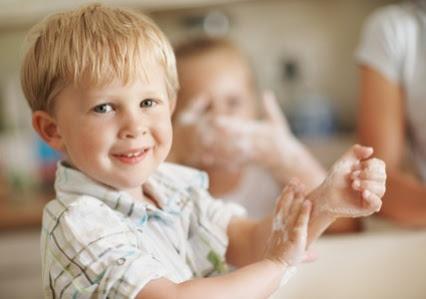Good personal hygiene habits start in early childhood, but it is the parents’ responsibility to teach their children that clean equals healthy. Children are not necessarily dirty per se, but their natural exploratory and playful tendencies may indeed be at odds with the most basic precepts of cleanliness. However, the benefits of personal hygiene for kids remain the same through adult life. Those benefits are preservation of health, avoidance of disease, and social acceptance. Children whose parents neglect their personal hygiene appearance are often bullied because of how they look and smell. Of course bullying is never justified, but poor hygiene habits should not be tolerated either.
When a baby makes the transition into childhood, it may be more of a challenge to keep her fresh. As a child grows, so do his opportunities for the face, hands and feet to become messy and dirty. Learning proper cleanliness skills in childhood can help prevent the spread of germs and illness, according to Parents. As a child grows, good personal hygiene becomes increasingly important because hormonal changes during puberty lead to stronger body odor and oilier hair and skin.

importance of personal hygiene for kids
Oral Hygiene
It goes without saying that the teaching of good oral hygiene is essential for the young. Their milk teeth are likely to fall out and they must know how to prevent this happening to their adult teeth. Along with brushing technique, the importance of dietary influences should be explained and alternatives treatment to sweets, biscuits and fizzy drinks should be made available.
Hand Washing
Hand washing is the No. 1 line of defense against germs, according to Kids. A child should learn to wash his hands frequently, especially before meals and after going to the bathroom. The Mayo Clinic suggests placing a chart near the bathroom sink as an incentive to note each time a child washes her hands.
Brushing Teeth
Always brush teeth. Especially brush them after breakfast and before going to bed. Brush them for 3-5 minutes and brush gently; otherwise it will damage your gums. It is very profitable if parents invest to get them a decent electric brush.
Bathing
A daily bath or shower is necessary to keep a child’s body clean and free of germs, according to Parents. Bath time can be more enjoyable if your child understands that it’s part of an established routine, such as before bed or first thing in the morning. A child should learn to to wash her face, armpits, ears, genital area, feet and hands. It’s also important to scrub underneath fingernails and toenails, where dirt may become trapped.
Hair Care
Hair washing is essential to good personal hygiene for children. But unlike bathing, a child’s hair doesn’t necessary have to be shampooed every day, according to Parents. In fact excess washing can cause hair to dry out and may cause an itchy scalp–even hair loss. Active kids who are outdoors or who sweat a lot may need to wash their hair more frequently. This is particularly true for kids nearing puberty, when hair is apt to be oilier and attract more dirt.

hygiene tips for kids
Foot Care
Shoes and feet are the easiest home to diseases. If you don’t want your kids to become a subject to allergies, never listen to them when they hold down on taking off their favorite pair of shoes. Wash and then dry feet carefully, especially between the little toes of your feet. Spending a lot time under your shoes can be a subject to accumulation of a lot of bacteria due to sweat. So it is better to take off shoes at home and walk bare footed. Never wear a single type of shoe and wash, polish or brush them as needed.
Food Hygiene
Children should be encouraged to wash their hands before meals and snacks, and should be discouraged from eating off the floor; this is especially important if there are pets in the house. Using cutlery allows the child to learn table manners and will lessen the chance of the transfer of germs from the hands to the mouth. Teaching the correct principles of personal hygiene should begin at as early an age as possible. It will help to prevent the spread of infections and diseases that can damage the digestive tract, respiratory tract, and the external features of the body. Children will follow the example set to them by their carers, so adults should lead by example. Less incidence of illness means fewer absences from school and less time needed to be taken off work. Maintaining correct hygiene will allow the child to be independent and will lessen the likelihood of bullying if they are kept clean and tidy and do not suffer from associated complaints.
